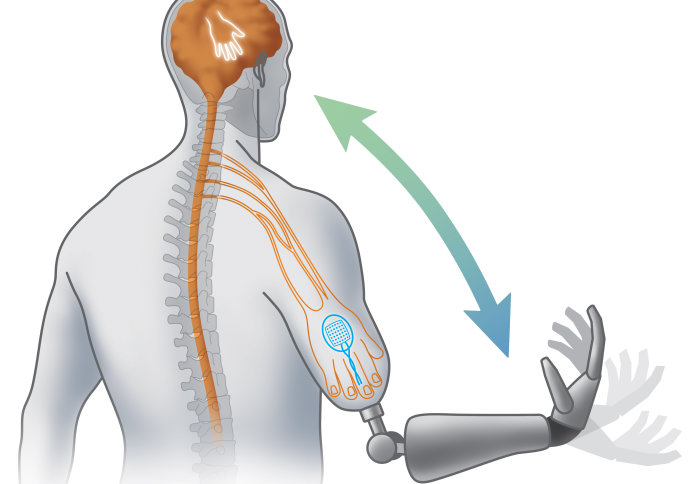Imperial academics win €10m ERC grant to give bionic limbs sense of touch

Imperial researchers have won a prestigious European Research Council (ERC) Synergy Grant worth €10m, to give bionic limbs natural sensations.
The grant was awarded to an international group, led by Imperial College London’s Professor Dario Farina, which aims to replace human limbs with robotic parts that the user will feel and command as part of their body.
This funding will help us launch prosthetic technology into a new era. Professor Dario Farina
The funding will help the group to develop prosthetic arms and legs that can sense the environment and deliver the sensations to patients.
The highly-coveted ERC Synergy grants enables small groups of Europe's best researchers to bring together interdisciplinary and complementary skills.
The ERC will fund 27 groups across Europe in this round of funding, worth a total €250 million.
Professor Farina, of Imperial’s Department of Bioengineering, said: “We have partly worked out how to let the brain command a prosthetic limb. Now, we want to reach fully natural control and to have the limbs talk back to the brain via natural sensations.
“This funding will help us launch prosthetic technology into a new era.”
Handy work
In 2017, Professor Farina’s research group developed an arm that patients could move at will, by using a sensor to pick up movement from muscles in a stump and convert them into commands for the arm.
Now, with the funding awarded as part of the European Union’s Horizon 2020 research and innovation programme, the researchers will work with a selection of patients to develop a novel breakthrough idea for controlling and feeling robotic limbs.
First, they will surgically build in each patient a so-called ‘bio-hub’, to where nerves that deliver control signals to the missing limbs and sensations to the brain are surgically directed. The bio-hub will be hosted in muscle tissue to host the nerves for movement control, and in transplanted skin tissue to host the nerves for sensations.
The ERC is proud to provide significant help in the pursuit of such ambitious research with great potential to achieve major advances at the frontiers of knowledge. Professor Jean-Pierre Bourguignon President of the ERC
The bio-hub, which is a combination of surgically reinnervated muscle and skin tissues, will connect to electrodes which will pick up the nerve electrical activity for control and for sensations through the transplanted skin.
Finally, the interfaced bio-hub will communicate with soft robotic limbs that replicate the natural compliance of human limbs.
Professor Farina said: “Creating a hyper-reinnervated bio-hub is equivalent to building bio-connectors that will allow us to receive signals from the spinal cord and to provide sensations, such as the sense of limb position, into the spinal cord. In this way, we will be able to connect the spinal cord circuitries with robotic limbs to make them a natural part of the patient’s body.”
Natural BionicS
Natural BionicS is the first initiative to combine the disciplines of neurointerfacing, neurosurgery and robotics, which have been combined to reach a common goal run by three leading experts in the respective fields.
Professor Farina leads the neural interfacing aspect, while Professor Oskar Aszmann from the University of Vienna, leads the neurosurgery side, and Professor Bicchi of the Italian Institute of Technology, leads on robotics.
The multidisciplinary approach is designed to encourage cross-talk between the disciplines and improve connections between the brain, spinal cord, and prosthetic limbs. The researchers say the approach helps to fill the gap between academic research and clinical impact, allowing them to be patient-focused.
The funds will be split equally between the three project participants.
President of the ERC, Professor Jean-Pierre Bourguignon, said: “The selected projects represent truly daring ideas put forward by some of Europe’s top scientists. The ERC is proud to provide significant help in the pursuit of such ambitious research with great potential to achieve major advances at the frontiers of knowledge.”
The work will be done in collaboration with the Christian Doppler Research Foundation of the Austrian Federal Ministry of Science, Research and Economy and the European Union’s Horizon 2020 research and innovation programme.
Article supporters
Article text (excluding photos or graphics) © Imperial College London.
Photos and graphics subject to third party copyright used with permission or © Imperial College London.
Reporter
Caroline Brogan
Communications Division